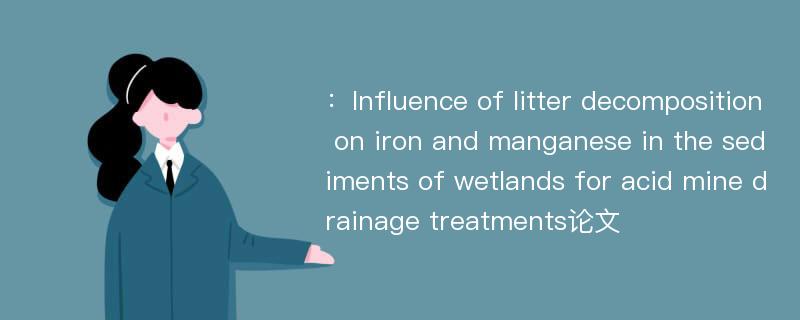
本文主要研究内容
作者(2019)在《Influence of litter decomposition on iron and manganese in the sediments of wetlands for acid mine drainage treatments》一文中研究指出:Plant litter will influence the bioavailability of heavy metals in sediments of wetlands used to treat acid mine drainage. To investigate the effect of plant litter on sediments in wetlands and define the comprehensive and continuous role of plant litter, different mass ratios(0%,5%, 20%) of litter were added into the sediments to study the influence of litter decomposition on the overlying water and sediments. The changes in pH, EC, Eh, Fe, and Mn of the overlying water and the organic matter in the sediments and the forms of Fe and Mn after 1, 7, 14, 21, and 28 days of litter decomposition were studied. The results indicated that litter decomposition increased the pH, EC, and reduced Eh of the overlying water. Litter decomposition promoted the release of Fe and Mn from the sediments into the overlying water and with the continuous decomposition of litter, the concentration of Fe and Mn in the overlying water declined. Litter decomposition increased the content of the organic matter in the sediment, and the forms of Fe and Mn indicated that litter decomposition could significantly affect the transformation of the forms of Fe and Mn.Reducible Fe was the main form in the sediments. Litter decomposition promoted the transformation of reducible Fe, the main form found in the sediments, intoexchangeable and oxidizable Fe, but had no effect on residual form. Exchangeable Mn was the main form in the sediments, and litter decomposition accelerated the transformation of reducible Mn, most commonly found in the sediments, into oxidizable Mn and had little influence on the exchangeable and residual forms.
Abstract
Plant litter will influence the bioavailability of heavy metals in sediments of wetlands used to treat acid mine drainage. To investigate the effect of plant litter on sediments in wetlands and define the comprehensive and continuous role of plant litter, different mass ratios(0%,5%, 20%) of litter were added into the sediments to study the influence of litter decomposition on the overlying water and sediments. The changes in pH, EC, Eh, Fe, and Mn of the overlying water and the organic matter in the sediments and the forms of Fe and Mn after 1, 7, 14, 21, and 28 days of litter decomposition were studied. The results indicated that litter decomposition increased the pH, EC, and reduced Eh of the overlying water. Litter decomposition promoted the release of Fe and Mn from the sediments into the overlying water and with the continuous decomposition of litter, the concentration of Fe and Mn in the overlying water declined. Litter decomposition increased the content of the organic matter in the sediment, and the forms of Fe and Mn indicated that litter decomposition could significantly affect the transformation of the forms of Fe and Mn.Reducible Fe was the main form in the sediments. Litter decomposition promoted the transformation of reducible Fe, the main form found in the sediments, intoexchangeable and oxidizable Fe, but had no effect on residual form. Exchangeable Mn was the main form in the sediments, and litter decomposition accelerated the transformation of reducible Mn, most commonly found in the sediments, into oxidizable Mn and had little influence on the exchangeable and residual forms.
论文参考文献
论文详细介绍
论文作者分别是来自Acta Geochimica的,发表于刊物Acta Geochimica2019年01期论文,是一篇关于,Acta Geochimica2019年01期论文的文章。本文可供学术参考使用,各位学者可以免费参考阅读下载,文章观点不代表本站观点,资料来自Acta Geochimica2019年01期论文网站,若本站收录的文献无意侵犯了您的著作版权,请联系我们删除。
